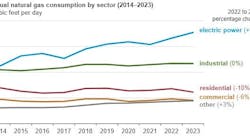Sam Fletcher
Senior Writer
HOUSTON, Aug. 29 -- The new front-month natural gas contract led the fall of energy commodity prices Aug. 28 in the New York market as a bigger-than-expected injection of gas into US underground storage shifted traders' attention from what could be the first major storm to threaten Gulf Coast petroleum production and processing in 3 years.
The Energy Information Administration reported the injection of 102 bcf of gas into US underground storage during the week ended Aug. 22. As a result, gas storage is now near 2.7 tcf, 200 bcf less than in the same period a year ago but 71 bcf above the 5-year average. In New Orleans, analysts at Pritchard Capital Partners LLC said, "Even with Tropical Storm Gustav's path likely targeting oil and gas infrastructure in the Gulf of Mexico, not to mention the two to three other systems that are forming behind it, traders were unable to ignore such a large injection this late in the summer."
In Houston, analysts at Raymond James & Associates Inc., said, "Over the last month, the year-over-year storage deficit has moved from 350 bcf to 200 bcf …. Obviously, weather is playing its part, but the tremendous onshore production volumes we have feared appear to be showing up in storage in spades. Gas sold off almost $1/Mcf after the report, but rallied to close the day only down 56¢/Mcf." Energy prices were climbing in early trading Aug. 29, with some volatility expected with the expiration of September contracts for heating oil and reformulated blend stock for oxygenate blending (RBOB). Gustav's potential threat headed into a 3-day holiday weekend in the US also should force traders to cover positions.
Gustav was over open waters of the Caribbean Aug. 29 and was expected to intensify into a hurricane within 24 hours and make landfall in Louisiana west of New Orleans early next week. The Department of Energy declared it would quickly release crude from the Strategic Petroleum Reserve if Gustav were to disrupt oil production in the Gulf of Mexico. But such action by the DOE "was never in doubt," said Olivier Jakob at Petromatrix, Zug, Switzerland. Jakob also noted the International Energy Agency in Paris said other members of the Organization for Economic Cooperation and Development are ready to release product stocks to offset losses to Gustav, just like they did when Hurricane Katrina came ashore Aug. 29, 2005, near New Orleans, devastating Gulf Coast oil and gas operations.
"However, with so much idled refining capacity in the US, it is far from certain that the US would need this year to pull on OECD product stocks," Jakob said. "A refinery taken out by a storm would create a tighter market (due to an improvement in the capacity utilization) but not necessarily an oil crisis."
The US Minerals Management Service said as of mid-day Aug. 28 that workers had been evacuated from just 2 of the 717 manned production platforms and 1 of the 121 rigs currently in the federal waters of the Gulf of Mexico, with no reports oil or gas production yet shut in. However, Shell Oil Co. officials said Aug. 29, "We will be down to minimum production operations staffing levels by the end of today and expect to continue the orderly shut-in of all Shell operated gulf production by Saturday, consistent with our personnel evacuation plans." They said they will continue to monitor both Gustav in the Gulf and Tropical Storm Hanna, currently over the Atlantic.
In Houston, independent producer Swift Energy Co. began standard shutdown procedures in its coastal Louisiana properties, evacuating nonessential personnel and equipment from Lake Washington field in Plaquemines Parish, Bay de Chene field in Jefferson and Lafourche Parishes, and Horseshoe Bayou field, Bayou Sale field, and Cote Blanche Island field, in St. Mary's Parish. That includes securing the bores of five wells being drilled in Lake Washington and Bay de Chene before towing the five rigs to safe harbor. One rig under tow to a new location has already been diverted to safe harbor. One completion rig in Lake Washington is being moved to protected waters. Swift officials said production from Cote Blanche Island will be shut in Aug. 29, with the company's remaining coastal Louisiana fields to be shut in and evacuated by Aug. 31 if weather conditions dictate.
In other news, the US Commerce Department said Aug. 29 personal incomes fell 0.7% in July, the biggest drop in nearly 3 years and a far larger decrease than analysts expected. Meanwhile, consumer spending inched up just 0.2%, in line with expectations but down from June's 0.6% increase. When rising prices are factored in, spending actually fell 0.4% in July, the weakest showing for inflation-adjusted spending in more than 4 years.
Energy prices
The October contract for benchmark US light, sweet crudes traded fluctuated at $114.08-120.50/bbl Aug. 28 before closing at $115.59/bbl, down $2.56 for the day on the New York Mercantile Exchange. The November contract dropped $2.45 to $115.99/bbl. On the US spot market, West Texas Intermediate at Cushing, Okla., was down $2.56 to $116.09/bbl. Heating oil for September lost 7.91¢ to $3.18/gal on NYMEX. The September RBOB contract declined 4.58¢ to $3.02/gal.
The new front-month October natural gas contract dropped 55.8¢ to $8.05/MMbtu on NYMEX, erasing most of its previous Gustav-related price gains in gas. On the US spot market, gas at Henry Hub, La., fell 21¢ to $8.26/MMbtu.
In London, the October IPE contract for North Sea Brent crude was down $2.05 to $114.17/bbl. Gas oil for September fell $9.25 to $1,032.25/tonne.
The average price for the Organization of Petroleum Exporting Countries' basket of 13 reference crudes increased 6¢ to $111.85/bbl on Aug. 28.
Contact Sam Fletcher at [email protected]
